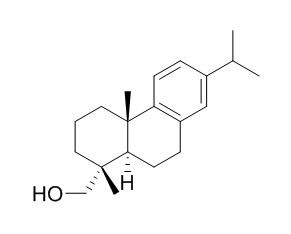Dehydroabietinol
Dehydroabietinol inhibits growth of chloroquine-sensitive as well as chloroquine-resistant strains of Plasmodium falciparum cultivated in erythrocytes in vitro (IC 50 26-27 microM).
Inquire / Order:
manager@chemfaces.com
Technical Inquiries:
service@chemfaces.com
Tel:
+86-27-84237783
Fax:
+86-27-84254680
Address:
1 Building, No. 83, CheCheng Rd., Wuhan Economic and Technological Development Zone, Wuhan, Hubei 430056, PRC
Providing storage is as stated on the product vial and the vial is kept tightly sealed, the product can be stored for up to
24 months(2-8C).
Wherever possible, you should prepare and use solutions on the same day. However, if you need to make up stock solutions in advance, we recommend that you store the solution as aliquots in tightly sealed vials at -20C. Generally, these will be useable for up to two weeks. Before use, and prior to opening the vial we recommend that you allow your product to equilibrate to room temperature for at least 1 hour.
Need more advice on solubility, usage and handling? Please email to: service@chemfaces.com
The packaging of the product may have turned upside down during transportation, resulting in the natural compounds adhering to the neck or cap of the vial. take the vial out of its packaging and gently shake to let the compounds fall to the bottom of the vial. for liquid products, centrifuge at 200-500 RPM to gather the liquid at the bottom of the vial. try to avoid loss or contamination during handling.
Separations2021, 8(7),90.
Vietnam Journal of Food Control.2022, 5(2): 115-128.
J Drug Target.2016, 24:1-28
Phytomedicine.2022, 100:154085.
Nutrients.2017, 10(1)
BMC Plant Biol.2020, 20(1):214.
Neuropharmacology.2018, 131:68-82
Pharmaceuticals (Basel).2024, 17(8):988.
Malaysian Journal of Analytical Sciences2023, 27(4):840-848.
Current Analytical Chemistry2024, 20(8):599-610.
Related and Featured Products
Planta Med. 2002 Jun;68(6):547-9.
Possible artefacts in the in vitro determination of antimalarial activity of natural products that incorporate into lipid bilayer: apparent antiplasmodial activity of dehydroabietinol, a constituent of Hyptis suaveolens.[Pubmed:
12094303]
METHODS AND RESULTS:
Dehydroabietinol isolated from Hyptis suaveolens (L.) Poit. was found to inhibit growth of chloroquine-sensitive as well as chloroquine-resistant strains of Plasmodium falciparum cultivated in erythrocytes in vitro (IC 50 26-27 microM).
However, erythrocytes exposed to Dehydroabietinol were transformed in a dose-dependent manner towards spherostomatocytic forms with concomitant formation of endovesicles, as disclosed by transmission electron microscopy. The erythrocyte shape alterations caused by Dehydroabietinol correlated well with its apparent IC 50 value.
CONCLUSIONS:
Thus, Dehydroabietinol incorporates into the erythrocyte membrane, and since invasion and survival of Plasmodium parasites is known to depend on the function of the erythrocyte membrane, the observed antiplasmodial effect of Dehydroabietinol is presumably an indirect effect on the host cell. Because of these findings, microscopic investigations should be generally used to support claims of antimalarial effects of apolar natural products.



